|
.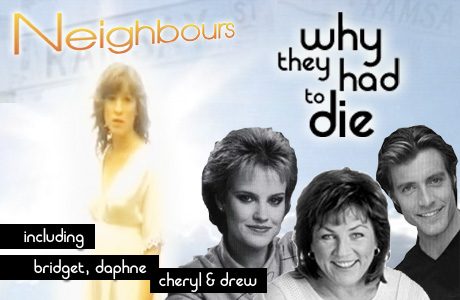
Features
> Why They Had To Die by Steve
It is often said that only the most popular soap opera characters are killed off, with writers wanting their passing to have as big an impact on the audience as possible. But occasionally, a character is so happy in a relationship, or so engrained in Erinsborough life, that finding a way for them to simply up and leave is almost impossible. Here, we look at some of those characters for whom death was inevitable when an actor chose to leave, and, with the help of Neighbours’ Supervising Script Editor Pete McTighe, we look at the scripting of the final moments of Bridget Parker, Ramsay Street’s latest victim of the grim reaper.

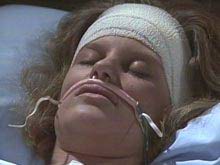 |
The first ‘big’ death for Neighbours came in 1988, over three years into the series’ run, when original cast member Elaine Smith finished filming as Daphne Clarke. Though she’s originally quit the role months before, the character had been given an unsatisfactory exit, moving away to care for her sick father, leaving behind her devoted husband Des, and taking their newborn son, Jamie. This exit was clearly only a temporary measure, and a few months later, as she made her way back from her father’s funeral, a car accident left her in a coma, which she never recovered her. Though upsetting for fans, this was the only satisfying way to separate the Clarkes. Similarly, in 1990, when Linda Hartley quit her role as Kerry, the character, though a free spirit, was too tied to Ramsay Street to realistically walk away. Pregnant, happily married to Joe and having only just patched up her differences with dad Harold, death was inevitable for Kerry, though few could have predicted that she’d be accidentally shot by duck hunters.
The following year, it was the turn of Kerry’s dad, Harold, to die. With Harold and wife Madge happily married, and Ian Smith given the chop in a bid to introduce some younger characters to the cast, death was the only option. But when Harold disappeared off some rocks into the ocean, no body was found, allowing producers to resurrect the character five years later. With Harold’s return came the opportunity a few years later to reintroduce the character of Kerry, as her daughter Sky came back to live in Erinsborough. But unlike her dad, Kerry’s death was final, so Linda Hartley provided voiceovers as Sky read Kerry’s diary, and returned in another role, as lookalike Gabrielle Walker, who confused Harold for a while before leaving for Darwin. And, following a few happy years back in Ramsay Street for Madge and Harold, this time it was Anne Charleston’s turn to quit and, as had been the case a decade before, there was no way the couple could be split up and so viewers witnessed Madge’s painful final weeks as she succumbed to cancer.
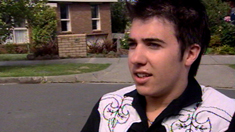 |
Later in the 1990s, plenty of drama was provided when Todd Landers, Jim Robinson and Helen Daniels were killed off. In all three cases, ways could easily have been found for the characters to simply move away, but their status as long-running members of the cast meant that death was a deserving tribute. Similarly, some deaths, though not necessarily the only option for a character, provided plenty of drama for those left behind – the deaths of Dee Bliss, Cameron Robinson, Stingray Timmins and Marco Silvani all gave weeks of story material for their loved ones.
When actress Julie Mullins quit her role as the sharp-tongued Julie Martin, there was no way the character, despite spiralling into depression in her final months, would leave behind daughter Hannah, or walk away from her other family members. Her death not only solved that problem, but also gave the remaining Martins a huge story as Philip was accused of murdering her. Two years later, with several family members in Ramsay Street, Cheryl Stark had little reason to leave, so when actress Caroline Gillmer was dropped from the role, her fate, under the wheels of a speeding car, was sealed. And similarly, after another six years had passed, family man Drew Kirk was happily settled with wife Libby and their newborn son, Ben. So when Dan Paris quit his role, Libby was in for a difficult time as Drew was thrown from a horse and died from his injuries.
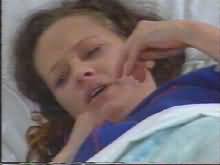 |
But there are still some deaths that we can’t quite explain – apart from the shock factor, there seemed little reason to kill off medical student Cody Willis only days before her planned move to Newcastle, while wiping out the Bishop family in a plane crash is still seen as one of the stupidest moves Neighbours has ever made.
But now we come to Bridget Parker. The latest Ramsay Street resident to exit Erinsborough in a coffin, Bridget’s life was just about perfect in her final days. Happily married to Declan, with newborn baby India a recent addition to their family unit, the exit of actress Eloise Mignon to continue her university studies gave the writers the perfect chance to craft a classic Ramsay Street death, affecting almost every other character on the show. And so we put a few questions to Supervising Script Editor Pete McTighe about just why Bridget had to die (though please be warned that his answers contain spoilers)…

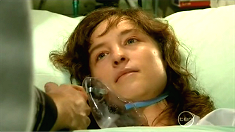 |
How far in advance did you know that Eloise was planning to leave? Did it spoil any longterm plans for Bridget and Declan?
We usually know well in advance when we’re parting ways with one of our actors. It did require a rethink of where we were taking Bridget and Declan, who’d grown into an inseparable ‘golden couple’, but at the same time Eloise’s departure also prompted some exciting story possibilities.
Were other departure stories considered, or did you see death as the only option for the character?
We settled on Bridget’s death very quickly. We had been on such a rollercoaster ride with Bridget and Declan, had invested so much in them as a couple – it seemed to us to be the only satisfying way out. Splitting them up I think would have appeared contrived and unsatisfying… I was a strong advocator from the get-go that the only way out of this, to do justice to the love story we had crafted over the past two years, was for Bridget to die. We made the final decision at a long-term planning conference, and worked out in broad strokes where the story would go after her death (for instance, exiting the Parkers and setting up who would ultimately be responsible for the crash).
Was it always intended that Bridget and Declan would marry before the birth, or was this added in to make her death even more tragic?
Yes Bridget and Declan would always have married. We had planned this for some time. We liked the idea of an impromptu, lower-key wedding… something more ‘earthy’ seemed much more in-tune with how Bridget was as a person.
 |
Do you struggle, when killing off characters, to find the correct balance between portraying the grief of those left behind, and not making the story too depressing, particularly in a show like Neighbours, which is well known for its comedy and light-hearted feel?
It is very difficult to strike that balance, especially in a show like ours which is lighter in tone than a lot of other serial dramas. But we decided from the outset that Bridget’s death needed to be treated with the impact and respect that the story deserved – which did mean the show would be darker in tone for a while. We accepted this, and ran with it. Everyone in the cast and crew embraced the idea and from a personal point of view I think it resulted in one of the strongest blocks of Neighbours ever. We're all very proud of what we achieved in that block.
How often do you personally feel that death should touch the lives of the Ramsay Street residents? Would you consider killing off two regulars in one year, for example?
Death is a currency that should be used sparingly in my opinion. When it’s infrequent it can have much more dramatic punch and emotional impact. From a personal point of view, I feel Bridget’s exit was such a massive, well-told story that I wouldn’t want to cheapen that by killing another character for quite some time. Unless of course we come up with a corker of a story – so you never know!
Back
|

